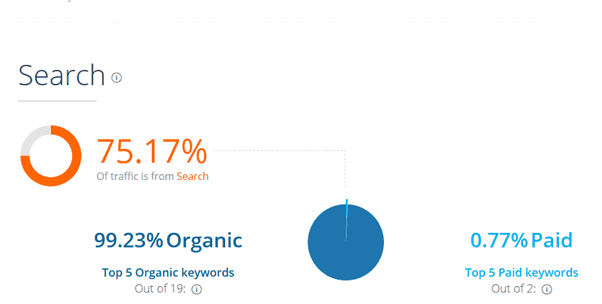Let’s recall this famous quote from Edmond Mbiaka – “The real success doesn’t happen overnight. It is your passion which never lets you give up on your idea, your spirit, and your goal”.
It’s very less likely that your market is not very competitive. I remember when Login Radius started their operations; there were only two giants in the business – Gigya and Janrain. Based on the fact that they had a better product and customer service, they could easily target their audience and market themselves strongly. They performed exactly the same plan and it was full of ease for them. But unfortunately, it’s not that easy for most of the industries.
 Whether you are a law firm, a health practitioner, a plumber, a carpenter shop, a marketing firm, or anything you name, you’ll see immense competition out there. The market is already flooded with boutique firms, one-man shows, and big brands. If you want your business to get survived and succeed, you have to shed light on your competition and get a solid idea of the landscape surrounding you.
Whether you are a law firm, a health practitioner, a plumber, a carpenter shop, a marketing firm, or anything you name, you’ll see immense competition out there. The market is already flooded with boutique firms, one-man shows, and big brands. If you want your business to get survived and succeed, you have to shed light on your competition and get a solid idea of the landscape surrounding you.
I am sure that you are already aware of this powerful marketing lantern – the competitor audit. The phase (Good if you adapt it as early as possible) is often used in the marketing campaigns which involve looking at your market and existing leading competitors and then assessing their marketing scenario/strategies. Sounds simple? Yes – but the benefits are numeral. Let’s see them one by one:
1. Stop Guessing. Get to Know the Accurate Information
Suppose John runs a social media agency in NYC. He is a start-up and rarely gets his query form completely filled. While his nearby boutique SMO agency, “XYZ Social Power” gets five queries daily from his online marketing. John is always thinking – what the heck XYZ is making to get tons of page views and real-time conversion. Is it PPC? Does it anything to do with affiliate marketing? Is XYZ involved in Black HAT SEO? He is assuming all the possibilities but couldn’t crack the exact reason.
(P.S. I inherited the example from the real world where John contacted me about the scenario. I’ve changed the names for obvious privacy concerns.)
So, what John needs to do is start conducting a marketing audit of XYZ agency (See their SEO performance, strategy, results, their social media campaigns, PPC campaigns, their newsletters by subscribing their list and so on). It is the right time for him to stop guessing and analyze what is working for XYZ.
2. It all stars with the unit testing
During my SEO consulting sessions, 85% of the Clients I talk with point me that their businesses are better than their competitors, but still, their conversion rate is comparatively slower. I respect their thoughts and mindset, but this thought process doesn’t result anything. They are not earning money and that’s the #1 concern. There might be a couple of good things about competitors. They might be prompt in responding to prospects, their real testimonials could be the reason behind their conversion success, their CTA buttons could do the magic, anything. It’s nearly impossible to reach the point without analyzing. The better approach is – see everything with unit testing.
3. Learning from Proven Sources
You are following businesses which are doing best and performing to the maximum extent. Right? This way, you are on the roadmap to learn the things which actually work in favor of a specific business.
When I Google “On Page SEO”, “Google ranking factors”, “link building” and all related terms, I see Backlinko all the time on Google’s page #1; and that’s a right selection of auditing for me. I must tell you – whatever he does, he makes with a perfection. The long guides, dwell time success, social shares, inbound links – everything is up to the mark and that’s why he is ranking so dominantly.
Start selecting your legitimate competitor and follow their white hat strategy. Don’t game anything.
4. Establish your tone
Following a competitor’s marketing strategy doesn’t mean that you exactly copy them. That’s a marketing sin. You need to learn the art of establishing a brand tone – a unique point of your brand persona. It will be a way to set you apart from the crowd and make you shine among competitors. If you are a technical person (designer, coder, or SEO), don’t mix this tone with the design layout, the UX architecture, or even with blogging. It is the sense of communication, the thought process, leadership, the concept advocacy and the writing paradigm.
Yes – It will ideally reflect on your web copies, headlines, social media posts, email newsletter and CTA buttons, just like what Genie Recycling accomplished after their rebranding overhaul.
 It is very closely related to the connection between the brand and your targeted audience. Larsen gave their thoughts on building your branding tone out of a 6 step process. It is a good read.
It is very closely related to the connection between the brand and your targeted audience. Larsen gave their thoughts on building your branding tone out of a 6 step process. It is a good read.
5. Build, Prove and Showcase Branding
You’re in a business. You’re competing with big houses. The marketing budget might be on a fringe, but that can’t stop you bringing credibility. It all requires your efforts and an out of the box thinking. Do have a look at this Marketing School episode by Eric and Neil Patel – you’ll find 100 percent practical advice from these marketing giants. With the tons of free/premium tools available today, it’s full of ease to build graphics, posters, proof-reading content drafts, and finding link prospects.
You need to stand out visually, conceptually, and creatively; and make sure your brand resonates with the seven characteristics of successful brands as written by Jason DeMers on Forbes.
Conclusion
Competitor Audit? You don’t have their Analytics, Search Console, and CMS access – but you can have access to Ahrefs, SEM Rush, Similar Web, and all other competitor audit tools. Start embracing the benefits of audit programs and you’ll find great rooms of improvement for your brand, your website, and your social media strategy.



